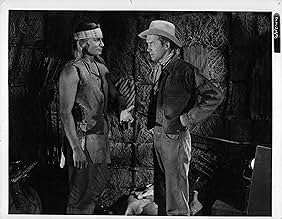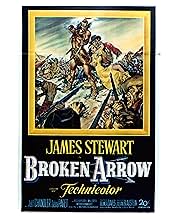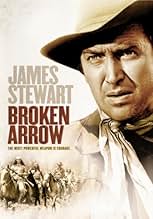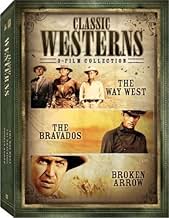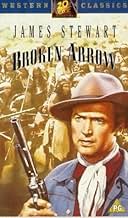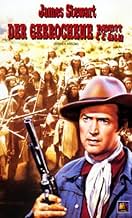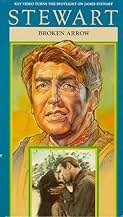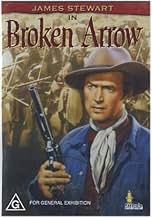NOTE IMDb
7,1/10
10 k
MA NOTE
Tom Jeffords tente de faire la paix entre les colons et les Apaches en Arizona.Tom Jeffords tente de faire la paix entre les colons et les Apaches en Arizona.Tom Jeffords tente de faire la paix entre les colons et les Apaches en Arizona.
- Réalisation
- Scénario
- Casting principal
- Nommé pour 3 Oscars
- 4 victoires et 6 nominations au total
Joyce Mackenzie
- Terry
- (as Joyce MacKenzie)
Robert Adler
- Lonergan - Stage Driver
- (non crédité)
Trevor Bardette
- Stage Passenger
- (non crédité)
Chris Willow Bird
- Nochalo
- (non crédité)
Raymond Bramley
- Col. Bernall
- (non crédité)
Chet Brandenburg
- Miner
- (non crédité)
Argentina Brunetti
- Nalikadeya - Cochise's Wife
- (non crédité)
Harry Carter
- Miner
- (non crédité)
Iron Eyes Cody
- Teese
- (non crédité)
J.W. Cody
- Pionsenay - Chosen Warrior
- (non crédité)
Heinie Conklin
- Townsman
- (non crédité)
Dolores Christine Cypert
- American Indian
- (non crédité)
- …
Avis à la une
Tagline: Of this motion picture the screen can be proud... Today... Tomorrow... A generation from now...
Worth repeating this tagline, because after seeing the film again for the first time in 42 years, it's right on. 50s westerns almost universally depicted Indians as pigeon-English speaking savages... or tried to talk Indian that translated to pigeon-Indian.
While the leading cast is all-Anglo, the perspective is that both sides in the Wild West were had more than a few intelligent, caring individuals among them. A willingness to sacrifice much (including renegades) to achieve a lasting peace is the message.
Jimmy Stewart had something to lose by doing a picture like this, but the acting here stands with any in his career. The portrayal of Cochise by Jeff Chandler is powerful, although unquestionably a little bit too noble-savagish.
"Let's mosey on over there" is a line spoken by Stewart toward the end of the film. Takes you back to a time when people took time to mosey.
A good-hearted picture by a little-known director standing up against the prevailing stereotypes. Wouldn't be surprised if Costner watched it more than once before making "Dances with Wolves".
Worth repeating this tagline, because after seeing the film again for the first time in 42 years, it's right on. 50s westerns almost universally depicted Indians as pigeon-English speaking savages... or tried to talk Indian that translated to pigeon-Indian.
While the leading cast is all-Anglo, the perspective is that both sides in the Wild West were had more than a few intelligent, caring individuals among them. A willingness to sacrifice much (including renegades) to achieve a lasting peace is the message.
Jimmy Stewart had something to lose by doing a picture like this, but the acting here stands with any in his career. The portrayal of Cochise by Jeff Chandler is powerful, although unquestionably a little bit too noble-savagish.
"Let's mosey on over there" is a line spoken by Stewart toward the end of the film. Takes you back to a time when people took time to mosey.
A good-hearted picture by a little-known director standing up against the prevailing stereotypes. Wouldn't be surprised if Costner watched it more than once before making "Dances with Wolves".
Broken Arrow was actually the start of James Stewart's return to the western genre. His first western was Destry Rides Again in 1939 and he waited for over 10 years to do another. After that he did them quite regularly.
Broken Arrow was made first, but held up over a year before release so Winchester 73 was actually Stewart's official return to the west. But both films had a lasting impact on his career.
This is the story of Army Captain Tom Jeffords who with a simple act of kindness started a peace process with the Apaches led by their charismatic leader Cochise. Jeffords, a veteran of the Union Army and the frontier wars is heartily sick of the slaughter he's witnessed and participated in. He finds an Indian boy who's been wounded by whites and he tends to them and heals him.
One thing leads to another and pretty soon Jeffords finds himself in the camp of Cochise with whom he strikes up a friendship. He also woos and wins an Apache maid named Sonseehray. Jeffords and Cochise with General Oliver O. Howard make a treaty with the Apache, at least most of them.
Broken Arrow did a lot for James Stewart, but even more for Jeff Chandler who plays Cochise. Cochise was a man in his late 60s when this was really taking place, but Chandler in his prematurely gray hair, portrays him well. Chandler got an Oscar nomination for Best Supporting Actor for Cochise.
Jeffords and Cochise are men of good will and decency who see an honest peace as the only answer. Of course both have to contend with people who won't or can't accept peace with the other race. It's those people and what they do break the peace that is the rest of Broken Arrow's story.
Delmar Daves is a good director of western films and in fact did another film about the U.S. government trying to make peace with another Indian tribe, the Modocs in Oregon, in the film Drumbeat. He gets good results out of the rest of the cast. Note the performances of Will Geer as an Indian hating rancher, Debra Paget as Sonseehray, and Basil Ruysdael as General Howard.
The screenplay was done by Albert Maltz of the Hollywood Ten. How ironic that Maltz was blacklisted after this film. I suppose a film about peace between the races and good will towards one's fellow men was highly subversive.
Broken Arrow was given much acclaim for being the first film to express the view that Indians were something more than bloodthirsty savages. That's not exactly true, other films around that time started saying the same thing. Nevertheless Broken Arrow's message is an eternal one.
Says so in the Scriptures if I'm not mistaken.
Broken Arrow was made first, but held up over a year before release so Winchester 73 was actually Stewart's official return to the west. But both films had a lasting impact on his career.
This is the story of Army Captain Tom Jeffords who with a simple act of kindness started a peace process with the Apaches led by their charismatic leader Cochise. Jeffords, a veteran of the Union Army and the frontier wars is heartily sick of the slaughter he's witnessed and participated in. He finds an Indian boy who's been wounded by whites and he tends to them and heals him.
One thing leads to another and pretty soon Jeffords finds himself in the camp of Cochise with whom he strikes up a friendship. He also woos and wins an Apache maid named Sonseehray. Jeffords and Cochise with General Oliver O. Howard make a treaty with the Apache, at least most of them.
Broken Arrow did a lot for James Stewart, but even more for Jeff Chandler who plays Cochise. Cochise was a man in his late 60s when this was really taking place, but Chandler in his prematurely gray hair, portrays him well. Chandler got an Oscar nomination for Best Supporting Actor for Cochise.
Jeffords and Cochise are men of good will and decency who see an honest peace as the only answer. Of course both have to contend with people who won't or can't accept peace with the other race. It's those people and what they do break the peace that is the rest of Broken Arrow's story.
Delmar Daves is a good director of western films and in fact did another film about the U.S. government trying to make peace with another Indian tribe, the Modocs in Oregon, in the film Drumbeat. He gets good results out of the rest of the cast. Note the performances of Will Geer as an Indian hating rancher, Debra Paget as Sonseehray, and Basil Ruysdael as General Howard.
The screenplay was done by Albert Maltz of the Hollywood Ten. How ironic that Maltz was blacklisted after this film. I suppose a film about peace between the races and good will towards one's fellow men was highly subversive.
Broken Arrow was given much acclaim for being the first film to express the view that Indians were something more than bloodthirsty savages. That's not exactly true, other films around that time started saying the same thing. Nevertheless Broken Arrow's message is an eternal one.
Says so in the Scriptures if I'm not mistaken.
Excellent adaptation of Elliott Arnold's book "Blood Brother" concerning the talk, the need, and the struggle for peace between the white man and the Apache Indians in 1870 Arizona. James Stewart is very effective as a brave former Scout for the Union who used to kill Indians but who now wants the slaughters to stop; he learns their tongue, sends up a smoke signal, and is soon in conference with Cochise himself to allow the U.S. mail-riders safely through Apache terrain...he also finds love with Indian princess Debra Paget, a romance his racist white brothers obviously resent (and at least one Apache soldier as well). Strong, moving story relies on the complicated interpersonal relationships between the characters for its impact, and the performances from Stewart, Paget, and Oscar-nominated Jeff Chandler do not disappoint. Beautifully filmed on rugged locations, Delmer Daves directs a winner, one of the best westerns of its era. *** from ****
While I have seen better westerns, I was really impressed with Broken Arrow. Not just because it is a very good film, but it is also different. While a lot of westerns deal with themes(some complex, some not so much)such as revenge and betrayal, Broken Arrow is a very poetic and elegiac film that you can see perfectly in how the story is constructed. Also the Indians here are portrayed as those in want of freedom with their families, which I found refreshing, seeing as I have seen them portrayed as quite brutal. Broken Arrow is a beautifully photographed film, the script flows nicely and is thought-provoking and the score is very stirring. The acting is fine, Debra Paget, breathtakingly-beautiful she is, and her scenes with Stewart are touching, is good but I couldn't help thinking they could have cast someone older. James Stewart is very believable in one of his better western performances, while Jeff Chandler gives the best performance of his career here and also the best performance of the movie too. All in all, excellent and very moving film. 8/10 Bethany Cox
Released in 1950 and directed by Delmer Daves, "Broken Arrow" stars Jimmy Stewart as a former soldier, Tom Jeffords, who saves an Apache teen after ten years of war between settlers and Natives in 1870, Arizona. When the boy's elders extend him mercy Jeffords sees the Apaches as human beings rather than faceless enemies for the first time and becomes the mediator between the warring factions. Jeff Chandler is stunning as the Apache leader, Cochise, but Debra Paget, only 16 years-old during filming, looks too whitebread to be believable. I love Debra, but casting her in this role is eye-rolling. To the film's credit, several of the peripheral Apache characters are played by Native Americans, including Jay Silverheels and John War Eagle.
The emphasis is on the Apache way of life and the movie is touted as the first pro-Indian Western ("pro-Indian" to a point), but this simply isn't the case. "Buffalo Bill" with Joel McCrea came out six years earlier and it was clearly favorable toward the Natives. "Broken Arrow" just goes a little further in this direction. Regardless, it is amazing to view Westerns from this long ago that are evenhanded regarding the Indian Wars, honestly portraying the Natives as hostile and formidable, but also with respect to their perspective and way of life. While obviously dated in some respects, both "Buffalo Bill" and "Broken Arrow" stand the test of time and remain entertaining and even enlightening to this day.
The movie runs 93 minutes and was shot in Arizona, but also Iversion Ranch & Alabama Hills, California.
GRADE: B+ or A-
The emphasis is on the Apache way of life and the movie is touted as the first pro-Indian Western ("pro-Indian" to a point), but this simply isn't the case. "Buffalo Bill" with Joel McCrea came out six years earlier and it was clearly favorable toward the Natives. "Broken Arrow" just goes a little further in this direction. Regardless, it is amazing to view Westerns from this long ago that are evenhanded regarding the Indian Wars, honestly portraying the Natives as hostile and formidable, but also with respect to their perspective and way of life. While obviously dated in some respects, both "Buffalo Bill" and "Broken Arrow" stand the test of time and remain entertaining and even enlightening to this day.
The movie runs 93 minutes and was shot in Arizona, but also Iversion Ranch & Alabama Hills, California.
GRADE: B+ or A-
Le saviez-vous
- AnecdotesThe broken arrow, which signals an end to fighting, is in fact a Blackfoot Indian symbol, not an Apache symbol. The Blackfoot are native to Montana and Alberta, Canada.
- GaffesWhen General Howard is beginning to pick himself off the ground after the Apache attack on the military wagon train, the first shot shows the ground to be mostly desert sand, with very little vegetation, but when the scene jumps to a long shot of the General getting up, the ground around him is almost entirely covered with green vegetation, showing scarcely any sand at all.
- ConnexionsFeatured in Family Classics: Family Classics: Broken Arrow (1963)
Meilleurs choix
Connectez-vous pour évaluer et suivre la liste de favoris afin de recevoir des recommandations personnalisées
- How long is Broken Arrow?Alimenté par Alexa
Détails
Box-office
- Montant brut mondial
- 10 145 $US
- Durée
- 1h 33min(93 min)
- Rapport de forme
- 1.37 : 1
Contribuer à cette page
Suggérer une modification ou ajouter du contenu manquant


